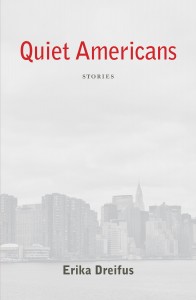A few months ago, debut novelist Ellen Meeropol (House Arrest) wrote about what she was learning about her own book from others, from those readers who had written pre-publication reviews and blurbs. “I didn’t expect to be surprised – and humbled – by readers’ insights into my characters and their story,” she wrote, detailing several examples of unanticipated illumination.

My story collection, Quiet Americans, received much less pre-pub attention than Elli’s wonderful novel did, but as reviews and comments have come in following the January release, I have been struck time and again by similar sentiments.
Earlier this month, for instance, I was wowed by two takes on the book. First, as part of his Short Story Month celebrations on the Emerging Writers Network, Dan Wickett devoted a detailed blog post to an analysis of the book’s title story: “The Quiet American, Or How to Be a Good Guest.” Dan focused on the use of second-person narration in this story and speculated as to why I might have chosen to employ it. His surmise made me think about this choice in an altogether new way.
Then, the Englewood Review of Books, a publication I learned about only when my publisher was contacted for a review copy, featured an extraordinarily comprehensive analysis of Quiet Americans by reviewer Rebecca Henderson. This review does so much. Not least impressive to me is the fact that the reviewer mentions every story in a substantive way.
But apart from the excellent summary and generous praise embedded in the review (I’m compared with Jhumpa Lahiri!), I found this exceptional observation, which I’d truly never considered:
In fact, five of the seven stories in Quiet Americans deal with pregnancy and birth, making this a major theme of the book. Dreifus uses the birth motif to show the undying connection between the generations of a family, the hope of new life in the face of sadness and death, and the frailty of human existence in a fallen world.
This observation impressed me as particularly interesting, because I’d certainly never set out to write a book whose “major theme” would be pregnancy and birth. It surprised me very much–pleasantly–to see that a reader engaged with the text on its own terms, and on hers, and discerned this thread on her own.
And that she showed me that it’s there.
 My Machberet is proud to serve as June host for the Jewish Book Carnival, “a monthly event where bloggers who blog about Jewish books can meet, read, and comment on each others’ posts. The posts are hosted on one of the participant’s sites on the 15th of each month.”
My Machberet is proud to serve as June host for the Jewish Book Carnival, “a monthly event where bloggers who blog about Jewish books can meet, read, and comment on each others’ posts. The posts are hosted on one of the participant’s sites on the 15th of each month.”